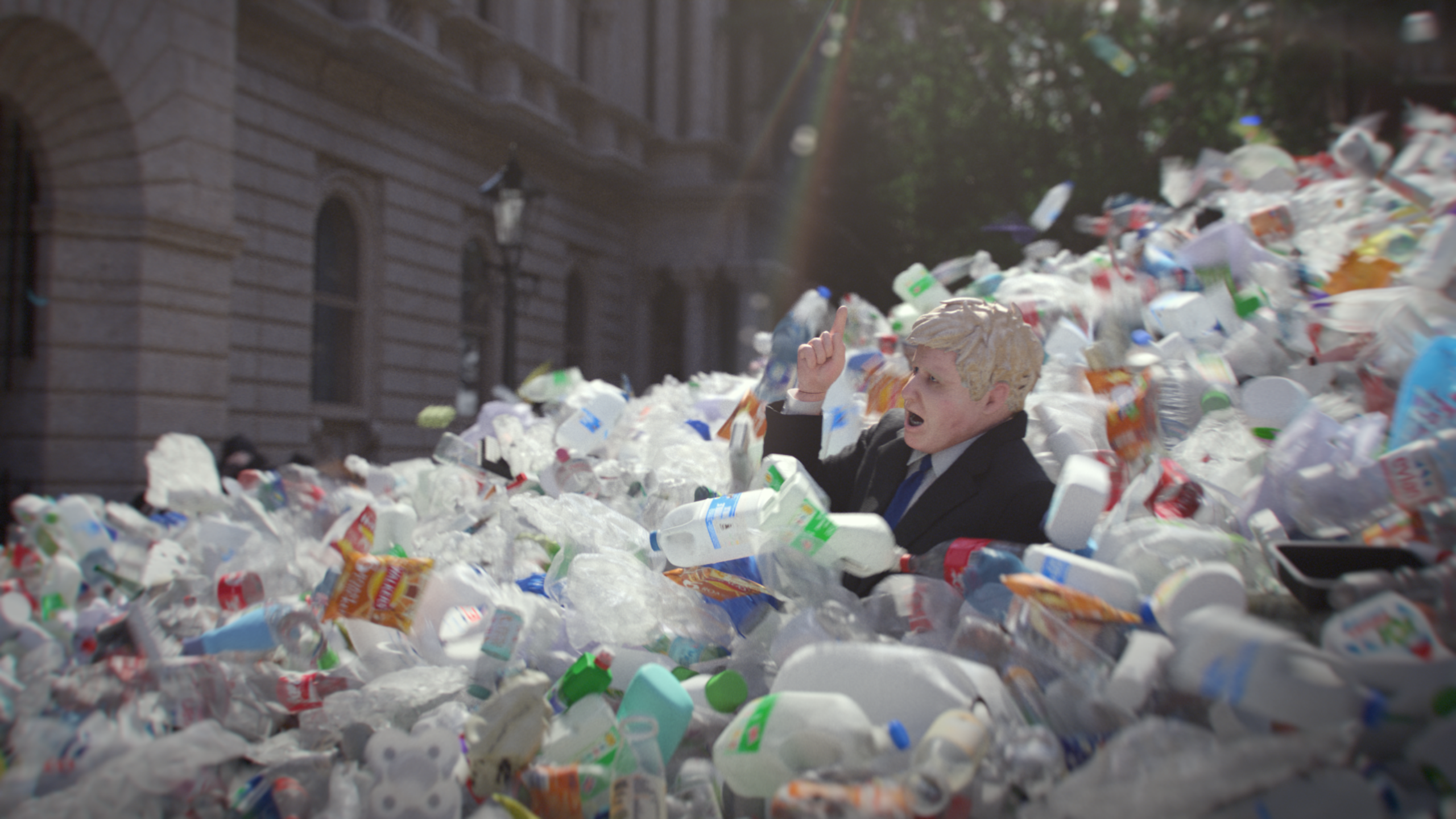
Breaking news – the Prime Minister is telling the truth! Can it be?!
Boris Johnson was all over the news last week after telling a room full of kids that recycling isn’t working. Some have said that he’s “losing the plot”… But believe it or not, we agree with the PM on this one.
Recycling alone is never going to be able to solve our plastic problem – and the UK is a “World Leader” in exacerbating the crisis, generating more household plastic waste per person than any other country except the USA.
Plastic is everywhere you look, from our supermarket shelves to our parks and our beaches. We will not be able to recycle our way out of this mess.
Read our six reasons why…
1. Our plastic is being shipped, dumped and burned.
Well over half of the plastic waste that Boris’s government counts as ‘recycled’ is actually sent overseas for other countries to deal with. Last year we were exporting 1.8 million kilos of the stuff a DAY, and the countries receiving it can’t cope.
Take Turkey, our top export location until this summer. Our Government increased exports of plastic here by a factor of 18 between 2016 and 2020, from just 12,000 tonnes in 2016 to a whopping 210,000 tonnes in 2020.
Earlier this year, a Greenpeace investigation found evidence of British plastic waste being dumped in fields, near rivers, on train tracks and by the roadside. In many cases, the plastic, which included packaging from seven of the top 10 UK supermarkets, was on fire or had been burned. This can have serious impacts on health.
People living near dump sites in Malaysia and other countries where we send our plastic waste say that plastic pollution and burning plastic are causing respiratory issues such as coughing and difficulty breathing, headaches and itchy, irritated eyes, and are concerned that exposure to these toxic fumes may also be causing problems with menstruation or higher rates of cancer.
The consequences of the UK’s ‘recycled’ exports are disproportionately felt by poorer communities and communities of colour. The UK’s current approach to plastic waste exports is part of a legacy of environmental racism. It is modern colonialism carried out through wealthy, predominantly white countries dumping toxic pollutants on people who lack the power and resources to resist.
2. Plastic can only be recycled a couple of times
Unlike glass and metal, most plastic can only be recycled once or twice before it becomes unusable.
Recycling plastic decreases the length of the polymers that they are made up of. Polymer length determines the strength, flexibility and weight of plastic. The shorter they are, the lower their quality.
This common misconception that plastic can be indefinitely recycled has been exploited to justify the continuous overproduction of plastic that no one really wants or needs.
Recycling should still be a piece of the puzzle, but it will never be the core solution. Greenpeace is calling for a 50% reduction in single use plastic – that remaining 50% needs to be plastic that we can easily recycle in the UK.
3. We don’t have the capacity
Official government stats tell us that the UK’s recycling rate in 2019 was 46.2%… but we think this number is in fact far smaller. In the UK we currently are recycling just 230,000 tonnes a year domestically, yet we produce over 5 million tonnes. Something’s not adding up!
No one knows exactly what happens to all of our household plastic because there’s no data on this (yet). However, given our low capacity for recycling here in the UK and the fact that we know much of our exports end up dumped or burned… it’s clear that we aren’t recycling anywhere near 46%.
And even if we were – it still wouldn’t be good enough
4. There’s too much
Nearly 370 million tonnes of plastic is created globally annually, 8 million of which end up in our oceans (the equivalent of one truck load every minute of every day of the year).
On top of that, despite all our best efforts – switching to reusable water bottles, (almost) always remembering to bring reusable bags out to the shop, and of course… recycling – plastic production is actually set to quadruple by 2050.
Whilst it’s undoubtedly important that we properly deal with plastic once it’s no longer useful (i.e. NOT dumping or burning or shipping to other countries to deal with), the bigger problem is that the amount of plastic currently being produced is completely unmanageable.
5. It’s not cost effective
Most types of plastic are recyclable. However whether or not they actually are recycled tends to rely on economic and technical factors.
For example, soft plastics (like salad/bread packaging) are extremely hard to recycle and there is a limited market for them. No market demand = no money to be made from recycling them = not gonna happen.
Therefore, what we end up with is plastic that is theoretically recyclable not being recycled because it’s not commercially viable.
The Government needs to stop delaying our long awaited Deposit Return Scheme. By adding value to worthless ‘throwaway’ plastic, DRS could help recover over an estimated 8 billion drinks containers wasted in the UK every year.
What’s even better is that since these schemes keep plastic in much better condition, DRS can be used to collect reusable packaging!
6. Fossil fuel companies are using it as justification to extract more oil and gas
Plastic is made predominantly from oil and gas – and it’s no secret how bad that is for the environment.
Fossil fuel companies that are infamous for destroying our planet (think ExxonMobil, Shell, etc) are now heavily investing in the petrochemical industry – chemicals made from oil, such as those used to make plastic – as a plan B to justify their dirty, extractive destructive ways.
In fact, petrochemicals will account for more than a third of the growth in world oil demand by 2030, and nearly half of the growth by 2050.
This is why we need to shift the focus to the other R’s – reduce and reuse. We can’t continue over producing non-essential plastic under the false pretense that we can recycle our way out of the colossal plastic crisis.
So no… we don’t think recycling is working either
Now, this may sound bleak but don’t stop doing your bit. Recycling is still part of the solution. What’s important to note is that no one wants all this non-essential plastic, it is forced upon us.
We need to transition to a system of reduction and reuse, which would allow us to stop exporting our plastic and manage what we produce in the UK. According to the Ellen MacArthur Foundation, this more circular economy could also be worth up to US$10billion!
We know that at least 85% of people in the UK want the government and retailers to cut the amount of plastic packaging. They have the power to sort this out now… so what is Boris waiting for?
The long awaited Environment Bill will give the government new powers to set legally binding targets, including on waste. The PM needs to turn his rhetoric into action and take this chance to set a target to reduce single-use plastic by 50% by 2025. The bill also gives the government powers to limit the export of plastic waste, which they should use to stop the export of plastic waste completely.
